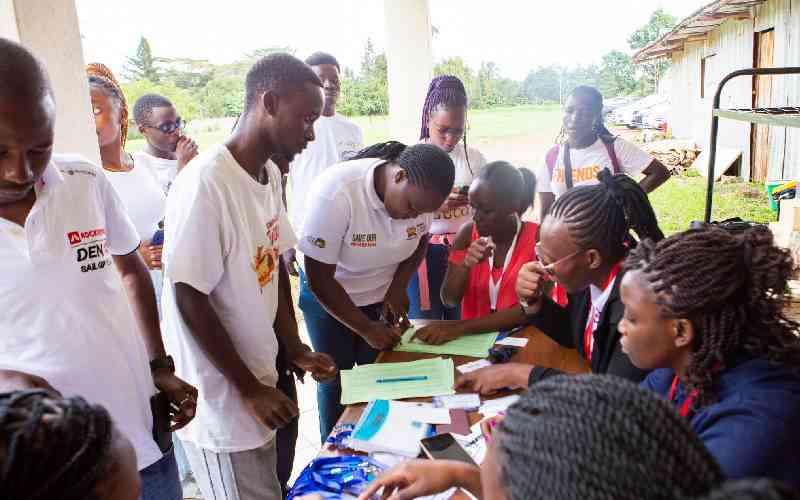A few years ago, they were the lowest of the low. They lived in squalor, ravaged by hunger and vermin. Putting food on the table was a mirage and mobility was firmly restricted to waddling around their compounds. Even so, one walked beyond the village centre if it was absolutely necessary.
The over 100 jigger survivors who lived like outcasts in Kigumo sub-county can now dare to dream.
The villagers, united by Ahadi Kenya Trust, are now proud owners of a banana plantation with over 2,000 plants. The farm has the capacity to generate a minimum of Sh600,000 each year.
Mercy Njeri, whose household was attacked by jiggers, says the villagers came together and formed the Kigumo-Ahadi self-help group, which is registered with the Government.
"We decided to start banana farming and use the proceeds to support ourselves and educate the children," she said when journalists visited the farm.
She says a bunch of bananas from the farm, established with support from Kenya Commercial Bank Foundation, can sell for Sh300 at the local market.
LIVELIHOOD SUPPORT
The farm can yield 100 bunches of bananas per week.
Ahadi Kenya Trust Executive Director Stanley Kamau last weekend witnessed the first harvesting of over 200 bunches from the farm.
Apart from the communal plantation, each beneficiary of the programme was given five banana plants for their own farms, which have also matured.
"It has improved their livelihood after rehabilitation. We have seen several jigger survivors build their own homes, with some even looking for women to marry," said Dr Kamau.
Many of the children who had dropped out of primary schools due to severe jigger infestation were also back in class.
Ms Njeri, who walked more than 10 kilometres with her two-year-old child strapped to her back to attend the function, said the project would save the community from hunger, as proceeds would be used to support the running of homes and other tasks.
“We used to depend on Ahadi for survival during critical times. Now we have the farm. The proceeds are shared equally among us by our management committee,” said the mother of four.
Ismael Mburu from Kahariro village is another beneficiary of the banana project. He said they now have a bright future owing to increasing demand for bananas.
Stay informed. Subscribe to our newsletter
BRIGHT FUTURE
"The beneficiaries of the project include dependants of the 300 original victims," said Mr Mburu, who is now an anti-jiggers campaigner.
Lucy Wambui described the project as a godsend as she is now assured of a constant supply of food after years of eking our a living as a vegetable vendor.
“Due to poverty, our children had dropped out of school. We are now assured of a constant flow of income from the banana plantation,” she said.
Peter Njuguna, who is completely healed of jiggers, said he would find a wife once he started selling bananas from his plants.
“I am able to feed myself and sell the surplus to the local market. I have totally recovered from jiggers and now plan to marry and start a family,” said Mr Njuguna.
According to the KCB Foundation representative, Pauline Ndonga, more than Sh3million has been used to rehabilitate people who had jiggers.
Murang’a County Commissioner Kula Hache, who was the chief guest, described the programme as a milestone towards lowering poverty levels.
The Ahadi Kenya Trust also plans to roll out rabbit farming and bee keeping in the county.
 The Standard Group Plc is a
multi-media organization with investments in media platforms spanning newspaper
print operations, television, radio broadcasting, digital and online services. The
Standard Group is recognized as a leading multi-media house in Kenya with a key
influence in matters of national and international interest.
The Standard Group Plc is a
multi-media organization with investments in media platforms spanning newspaper
print operations, television, radio broadcasting, digital and online services. The
Standard Group is recognized as a leading multi-media house in Kenya with a key
influence in matters of national and international interest.
 The Standard Group Plc is a
multi-media organization with investments in media platforms spanning newspaper
print operations, television, radio broadcasting, digital and online services. The
Standard Group is recognized as a leading multi-media house in Kenya with a key
influence in matters of national and international interest.
The Standard Group Plc is a
multi-media organization with investments in media platforms spanning newspaper
print operations, television, radio broadcasting, digital and online services. The
Standard Group is recognized as a leading multi-media house in Kenya with a key
influence in matters of national and international interest.






